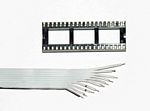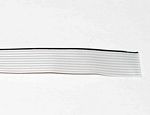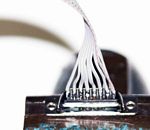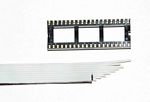Building the 1571 Internal Parallel Cable
12" of 10-conductor ribbon cable, with wire 1 marked in a different color
1 DB15 female connector
1 40-pin low profile precision socket (optional, for the socketed cable)
Getting started
 |
Step 2: Prepare one end We need to solder one end of the ribbon cable to the DB15 female port. Using fine scissors cut the wires apart back about 1" (3cm). Be sure not to cut to close to the wires while separating the wires to expose or cut them and cause shorts. Strip the wires back about 1/8" (3 mm) and twist and tin the wires. |
Step 4 is for the simpler soldered cable. For the socketed cable, follow steps 5a-5d.
 |
Step 4: Prepare other end Just like the one end that was stripped and soldered to the DB15 connector, we need to prepare the other end of the ribbon cable for soldering to the chip legs. Using fine scissors cut the wires apart back about 1" (3cm). Be sure not to cut to close to the wires while separating the wires to expose or cut them and cause shorts. Strip the wires back about 1/8" (3 mm) and twist and tin the wires. Wires 9 and 10 can be separated from the main group by about an extra .5" (1cm). |
 |
The finished soldered cable This is the finished cable. Label it "universal" because it will fit both the 1541 and 1571. |
Steps 5a-5d are for the socketed cable.
 |
Step 5c: Strip and solder wires Using fine scissors, cut the wires apart back about 1". Be sure not to cut the wires or get too close as you will expose the inside wires, possibly causing shorts. Get your wire strippers and strip the wires back only about 2 mm (about 1/8"), not too long. Twist and tin the wires. |
 |
The finished cable This is the finished cable. Label it "1571" because the 1571 internal socket adapter is not the same as the 1541 adapter and there will be no confusion later. Check the pinouts according to the chart below. |
Step 6: Install the cable
Follow these instructions to install the cable into your drive.
Pinouts for DB15 or wire# to the 40-pin socket or directly to the CIA.
DB15 or Wire# |
40-pin Socket or 6526/8521 CIA |
1 |
10 (PB0) |
2 |
11 (PB1) |
3 |
12 (PB2) |
4 |
13 (PB3) |
5 |
14 (PB4) |
6 |
15 (PB5) |
7 |
16 (PB6) |
8 |
17 (PB7) |
9 |
24 (FLAG) |
10 |
18 (PC) |
Ever wondered why the drive internal parallel cable uses 10 wires (8 data, PB0-PB7, and 2 handshake lines) but the X*P cable parallel portion only uses the 8 data lines? That's because the internal parallel cable was first made to hook up to the C64 which does use these extra handshake lines. The X cables don't need them as the handshaking is done on the serial lines.
Email the author: Peter Schepers | Last updated: June 11, 2009





